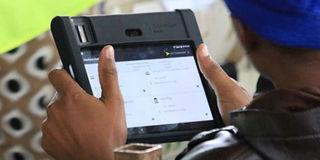IEBC reveals details of Sh2.4bn plan to end poll fraud

For the IEBC, managing the credibility of the repeat elections centres around its results transmission system, and that includes barring returning officers from sending results in the form of text messages without attaching proof in the form of signed forms. PHOTO | FILE | NATION MEDIA GROUP
What you need to know:
- Elections agency pushes for, among others, elaborate reconfiguration of all results transmission kits in Sh2.4 billion contract with French security firm.
- OT-Morpho has employed 400 people to reconfigure the kits and will also be deploying one support engineer per constituency on Election Day.
- The IEBC is anticipating a simple majority winner as stipulated under Article 138 (7) of the Constitution.
- Reconfiguring the kits to ensure they send images will get the commission out of the conundrum of having data it cannot explain.
Elections officials will not be allowed to submit poll results without accompanying them with proof of signed forms in the October 26 repeat elections, a contract between the elections agency and French security firm OT-Morpho shows.
This is among the steps the Independent Electoral and Boundaries Commission, in the Sh2.4 billion agreement, is pushing, to seal the loopholes that resulted in the annulment of the August 8 presidential election by the Supreme Court.
If the recommendations are implemented fully, all election officials at polling stations and constituency tallying centres will only send signed result forms to the IEBC’s transmission system, eliminating the contentious text messages used in the previous election.
The French firm, which is supplying information technology services to the IEBC, has employed 400 people to reconfigure the kits and will also be deploying one support engineer per constituency on Election Day.
OT-MORPHO
OT-Morpho, while accepting IEBC’s request, says in the agreement that “a new function of results transmission system application will allow IEBC returning officers to upload the official Forms 34B filled, verified and signed by IEBC”.
Also, the repeat election is not being prepared to go to a run-off, meaning the IEBC has locked out Third Way Alliance of Kenya candidate Ekuru Aukot, who is in the High Court fighting to be part of the race.
“The system is configured for the two following candidates: Mr Kenyatta (and) Mr Odinga,” says OT-Morpho. “Since there are only two candidates, the system is not configured to deal with any second round. Due to the limited timeframe, the system cannot accept other candidates.”
This means IEBC is anticipating a simple majority winner as stipulated under Article 138 (7) of the Constitution.
In the new changes, presiding officers at polling stations will now be able to transmit results to both the constituency tallying centre and the national tallying centre. They could not do that during the last General Election and, in some places, were baffled that there were results from their constituencies on the IEBC portal yet they had not seen the actual forms.
TRANSMISSION
“During the August 8th elections,” OT-Morpho says in the agreement, “the results transmission system application on the tablet allowed (officials) to send text results only after a first failed attempt. This option will be removed; only both text and image will be allowed.”
The disadvantage of this is noted in the agreement as there is no relief for the 11,155 polling stations the IEBC had said were in areas without 3G and 4G mobile phone network, which is deemed necessary for images to be sent.
“As a consequence, polling stations in low connectivity areas will fail to send results,” says the French firm, and polling officials will be required to move to areas with at least 3G coverage to send their results.
Reconfiguring the kits to ensure they send images will get the commission out of the conundrum of having data it cannot explain. At the Supreme Court, the IEBC’s lawyers could not explain the statement by their client that the information on the portal was “statistics” since the commission could not announce provisional results.
HOURLY REPORTS
The provisional results transmitted by the presiding officers will be consolidated at the constituency level into reports for the IEBC to compare the provisional data transmitted from the field with the official Forms 34B.
The system will be programmed to generate reports on an hourly basis for all constituencies and these will be displayed on a portal.
The agreement states that the connection between Safaricom, which shall provide the SIM cards, and the dedicated communication channel for the transmission of the results shall remain the same as the one used during the last General Election.
Ahead of the repeat elections, IEBC has been trying to have dialogue with the main political players, the National Super Alliance and the Jubilee Party, in a bid to reach a compromise on demands by the two sides.
The talks, at the Bomas of Kenya, collapsed on Thursday after Nasa protested the move by Jubilee to push through proposed changes to the Elections Act and the Election Offences.





